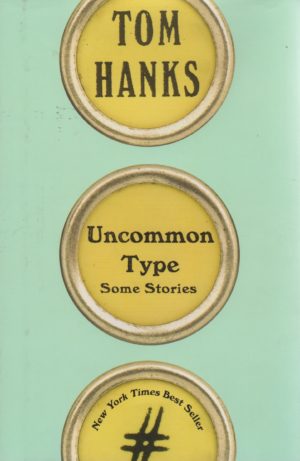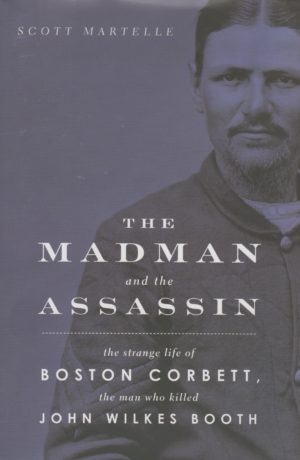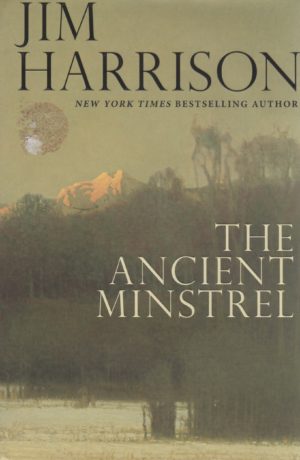
He was all ready to go. And then, he wasn’t.
Forty years ago, when my wife Rene’ and I were on the cusp of marriage, my dad approached me with a suggestion. No, Harry wasn’t trying to buy me off, to offer me hard cash if I’d stiff the woman I’d fallen in love with.
“Mom and I are taking your brother and sister to Canada. Jack Litman’s place. It’s a fly in. The Litmans and Mondales will be there.”
“OK…?”
“Well, are you doing anything for your honeymoon?”
I shook my head. Dad knew I was about to enter my third year, the toughest year, of law school. I was working full time at the Dorsey Law Firm as a legal assistant, making peanuts, paying my own way through school. Rene’ was finishing up her degree at the Main U. There’s no money for a honeymoon, I thought, though pride kept me quiet.
“Well, I’ll pay for you and Rene’ to come along.”
That was it. After a sleepless wedding night in a stuffy hotel room in Proctor (and not sleepless for the reasons you might think; shame on you!), Rene’ and I loaded ourselves into an already stuffed- to-the-ceiling Munger Family Suburban, crowding into the back seat with my brother and sister. Off we went. We had a grand time, spending five nights in a tent, my new bride and I sleeping on separate folding lawn chairs in separate sleeping bags. That bit of information aside, what other couple do you know can say they spent their honeymoon with the Vice President of the United States, protected by Secret Service, Canadian Mounties, and the Ontario Provincial Police?
The year was 1978. 30 years later, my dad approached me with a similar proposal.
“You want to go fishing with Fritz?”, “Fritz” being Mr. Mondale, now retired from public life.
“Sure.”
That trip renewed my acquaintance with the former Ambassador to Japan, Vice President, United States Senator, and Minnesota Attorney General. Thanks to that gracious invitation from Ross and Jay Litman, I was able to meet George Millard (a buddy of Mondale’s), Sam Perrella, III and his son Tony, Sam Litman (Jay’s son), and reconnect with old friends Doc Donley and Bruce Meyer. It’s a trip I’ve made every year since being invited except one. It’s a trip that’s heavy on laughter, great food, political bickering, and great fishing. This year, Harry was set to go; to, at nearly 91 years old, climb in and out of a de Havilland Otter and in and out of Sheriff Ross Litman’s fishing boat. He was eager to make the journey from his condo in Port Charolette to Duluth and have his eldest kid drive him and Mondale and George Millard to Ignace, Ontario and make the short flight to Elsie Lake. But fate intervened. Harry died on April 28th. His heart simply gave out. His memorial was held on June 1st. True to the strong ties such annual fishing trips create, everyone from the Litman trip attended the memorial to swap Harry stories, eat, share a toast, and remember.
For the past few years, I’d toyed with the idea of asking Ross if one of my four sons could make the trip but I never had the courage to ask. It’s not my trip; it’s Harry’s. So I kept my thoughts to myself until Harry’s passing. I emailed Ross not long after Dad’s memorial and broached the idea of seeing if Matt, my eldest and Harry’s oldest grandchild (and not insignificantly, a kid the Vice President managed to see baptized in 1980), couldn’t take Harry’s place. Not literally, of course, since there’s no way ANYONE could take Dad’s place. Ross and Jay approved the idea. Matt was able to sell it to his overburdened wife, Lisa, who would be stuck home with a new baby and two boys under the age of seven while Matt traipsed off to Canada. Matt must have promised Lisa the moon because she let him go. And so, we did. 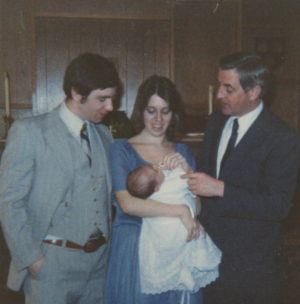 To say I’ve shed a few tears since Harry’s passing is to reveal that, despite nearly cancelling out of last year’s trip (Harry and I were in a spat, one that Sheriff Litman ordered me to “fix”, so I did), and many, many other disputes and disagreements Harry and I had since I was old enough to form opinions, I sincerely loved the craggy faced, gruff mannered, intimidating old litigator. Imagine being a little boy and being questioned by the most skilled cross examiner in the Duluth Bar. Every day of your life. That was our relationship, one that was, at times adversarial and contentious but was always, in a weird sort of a way, permeated by love and mutual respect. So asking Matt to “fill in” for Harry was not an easy thing to do. And yet, it felt so right to have Harry’s oldest grandchild sitting in the back seat of my Grand Cherokee with George, while Fritz reprised his familiar role of being my co-pilot on the drive from Duluth to Ignace.
To say I’ve shed a few tears since Harry’s passing is to reveal that, despite nearly cancelling out of last year’s trip (Harry and I were in a spat, one that Sheriff Litman ordered me to “fix”, so I did), and many, many other disputes and disagreements Harry and I had since I was old enough to form opinions, I sincerely loved the craggy faced, gruff mannered, intimidating old litigator. Imagine being a little boy and being questioned by the most skilled cross examiner in the Duluth Bar. Every day of your life. That was our relationship, one that was, at times adversarial and contentious but was always, in a weird sort of a way, permeated by love and mutual respect. So asking Matt to “fill in” for Harry was not an easy thing to do. And yet, it felt so right to have Harry’s oldest grandchild sitting in the back seat of my Grand Cherokee with George, while Fritz reprised his familiar role of being my co-pilot on the drive from Duluth to Ignace.
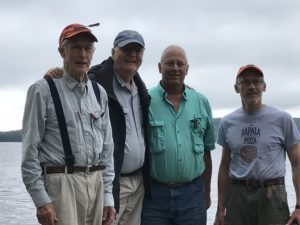
George, Fritz, Jay, and Ross.
Like most years, we spent our time at Elsie returning to the routine of camp life in the bush. Oh, don’t get me wrong. We don’t rough it on Elsie Lake. Not even close. Jay is an exceptional chef. Sammy, the third generation of Perrellas to own and run Sammy’s Pizza, always does his Italian heritage proud in the kitchen. Ross usually contributes, in addition to near constant movement and upgrading around camp, a fish fry. This year’s menu didn’t disappoint. We slept on comfortable mattresses in sleeping bags, drifting off-in my case since I bunked with the old guys- to sounds of C-Pap machines whirling away in the night. Sure, there were times where chores were mandatory. I’m the designated camp dishwasher, though this year, with the addition of a solar pump and a propane water heater, I no longer heated kettles of water on the propane cook stove for dishes. I simply turned on the tap and, shazam, hot water! George served, as he always does, as my assistant. Every meal, we cleaned and dried and stacked dishes, pots, pans, and utensils. This year, due to an unfortunate shoe incident (it’s top secret; ask the sheriff!), Ross and Jay determined that the sauna needed refurbishing. Actually, rebuilding would be a better term. I need to stop here to explain something about camp logistics. There are no roads leading to the Litman Camp.Whenever building materials or supplies or food or propane or gasoline or boats or motors are needed, those items must be loaded into or strapped to the floats of an Otter and flown in. Hell, that’s how Judge Jack Litman managed to bring a brand new pontoon boat into the Canadian wilderness years ago, a boat that’s still in use. The boat was flown in disassembled, the pontoons tied to the Otter’s floats, and rebuilt on site.
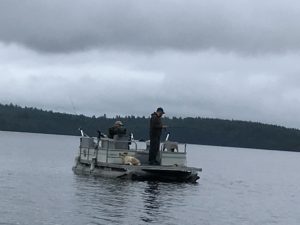
Jay and Matt fishing from the pontoon.
The sauna construction crew included Jay ( who once made his living in the carpentry trade), Ross, Tony, and me. It was hot and humid inside the little steam room as Tony and I measured and nailed cedar cut by Jay, sometimes getting the measurements spot on, other times, not so much. We had the advantage of a generator providing power for a table saw; and battery powered skill saws and nailers and drills; tools that didn’t exist back in the 1960s when the original cabin was built.

Mark and Tony fitting cedar planking in the sauna.
In between raindrops and chores and fishing and feasting, there were, of course, quiet moments when we each did our own thing. I spent much time, when not in the boat with Jay or Sammy or Ross devouring Jim Harrison’s last effort (see my review of The Ancient Minstrel elsewhere on this blog), and discussing writing with Fritz and George and Sammy.
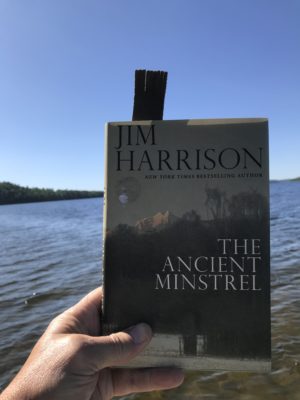
Reading on the dock.
Of course, the reason for us being in the middle of the Ontario wilderness, miles from roads and civilization, was to fish. And fish we did! The walleyes were somewhat cooperative; the small mouth bass-lively; the whitefish (pound for pound the fightingest fish in the lake) were completely absent; and the lake trout, scarce. Still, we found enough fish to keep our anticipation high and our expectations higher. There were no trophies landed; no eight pound lakers or twenty pound pike or 28″ walleyes. But that’s OK: had we landed such monsters, the slot limits on the lake (or the Litman ethic) would have required a quick photo and a release, allowing big fish the chance to grow bigger.
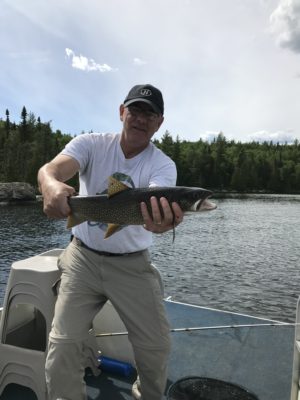
Elsie lake trout.
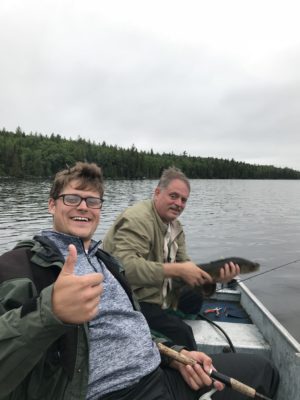
Tony and Sammy and Elsie walleye.
We humans weren’t the only ones missing Harry. The camp dogs, especially the two yellow labs Jada and Lilly, seemed out of sorts without my dad around.
“Why so?” you ask.
Those of you who know Harry, know he always had a Lab by his side until he left Minnesota for retirement in Florida. The list of Labradors that lived with Harry over his long life is endless. His affinity for the breed knew no bounds. Wherever he was, whether pheasant hunting in North Dakota or steelhead fishing on the Betsy River in Michigan, he found a Labrador to adopt and spoil. This was true at Elsie as well and I’m certain Jada’s and Lilly’s constant nudging our legs and hands beneath the kitchen table in Harry’s absence was a learned response: Dad always had a treat to share with his canine pals.

Lilly waiting for Harry.
But this year, their pal didn’t make the trip and the yellow dogs (thanks, Sam Cook!) shared the human contingent’s unsettled state. So many memories. So many thoughts. As the patriarch of the Munger Family now that Harry has passed, I found myself tearing up in, of all places, the outhouse, for chrissakes! I don’t want to leave you with the impression I was overcome with morose longing for the old man. I’ve learned, with the passing of both my stepfather and my father in the same year, that grief doesn’t work that way: at least not for me. No, the sadness didn’t hit me full on, in the face, like I’d expect losing a child or a spouse does. I suppose because death is an expected part of life, and as our parents age, we come to anticipate the inevitable, grief sneaks up and pinches you on the cheek, making you cry over the smallest remembrance. I had some of those moments at Elsie. I’m sure Fritz and George and Matt and the rest of the boys did too. We all missed Harry on this year’s trip, and will go on missing the old guy, in our own ways, as long as we’re around.
That’s just how it is.
Peace.
Mark

Harry and Fritz, Elsie Lake 2017.
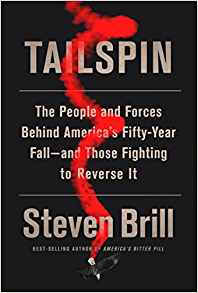

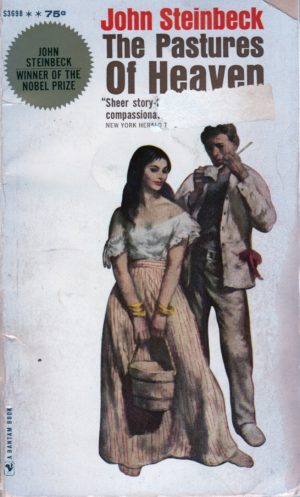
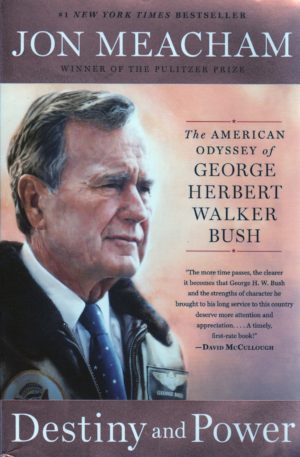



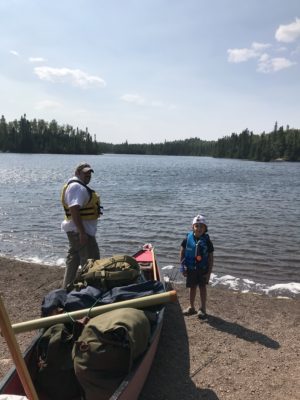
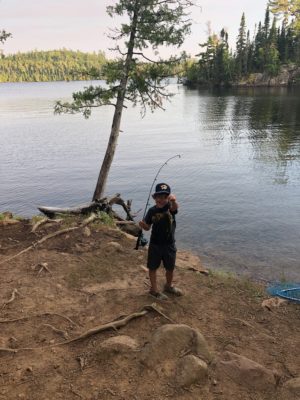

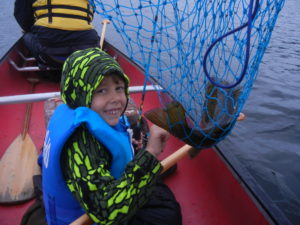



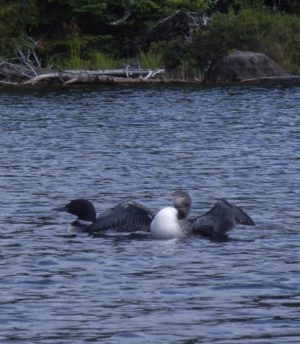
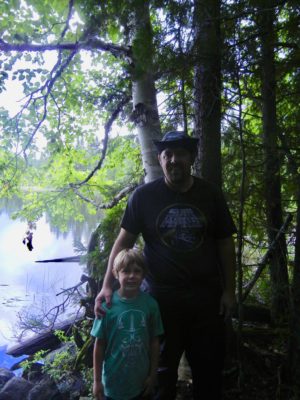
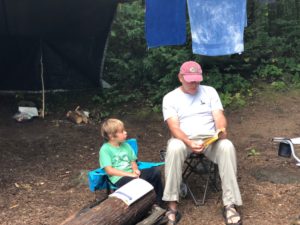



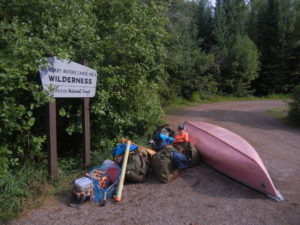

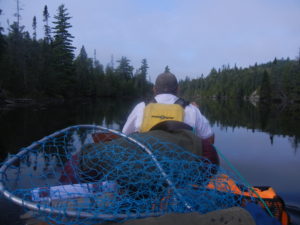

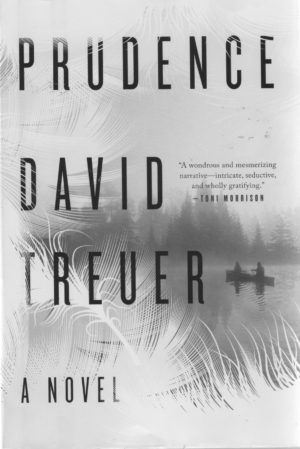
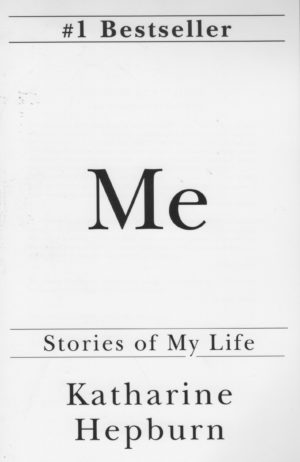

 To say I’ve shed a few tears since Harry’s passing is to reveal that, despite nearly cancelling out of last year’s trip (Harry and I were in a spat, one that Sheriff Litman ordered me to “fix”, so I did), and many, many other disputes and disagreements Harry and I had since I was old enough to form opinions, I sincerely loved the craggy faced, gruff mannered, intimidating old litigator. Imagine being a little boy and being questioned by the most skilled cross examiner in the Duluth Bar. Every day of your life. That was our relationship, one that was, at times adversarial and contentious but was always, in a weird sort of a way, permeated by love and mutual respect. So asking Matt to “fill in” for Harry was not an easy thing to do. And yet, it felt so right to have Harry’s oldest grandchild sitting in the back seat of my Grand Cherokee with George, while Fritz reprised his familiar role of being my co-pilot on the drive from Duluth to Ignace.
To say I’ve shed a few tears since Harry’s passing is to reveal that, despite nearly cancelling out of last year’s trip (Harry and I were in a spat, one that Sheriff Litman ordered me to “fix”, so I did), and many, many other disputes and disagreements Harry and I had since I was old enough to form opinions, I sincerely loved the craggy faced, gruff mannered, intimidating old litigator. Imagine being a little boy and being questioned by the most skilled cross examiner in the Duluth Bar. Every day of your life. That was our relationship, one that was, at times adversarial and contentious but was always, in a weird sort of a way, permeated by love and mutual respect. So asking Matt to “fill in” for Harry was not an easy thing to do. And yet, it felt so right to have Harry’s oldest grandchild sitting in the back seat of my Grand Cherokee with George, while Fritz reprised his familiar role of being my co-pilot on the drive from Duluth to Ignace.







